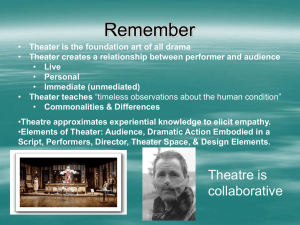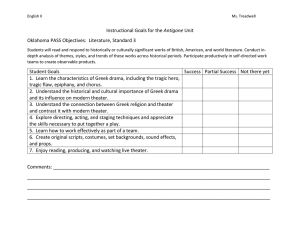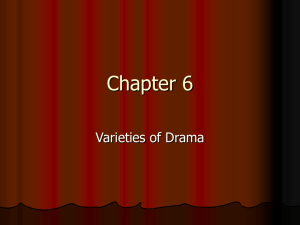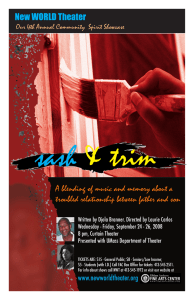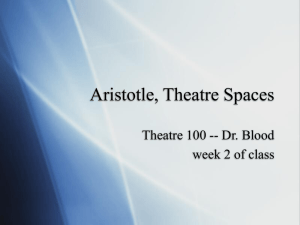First…
advertisement
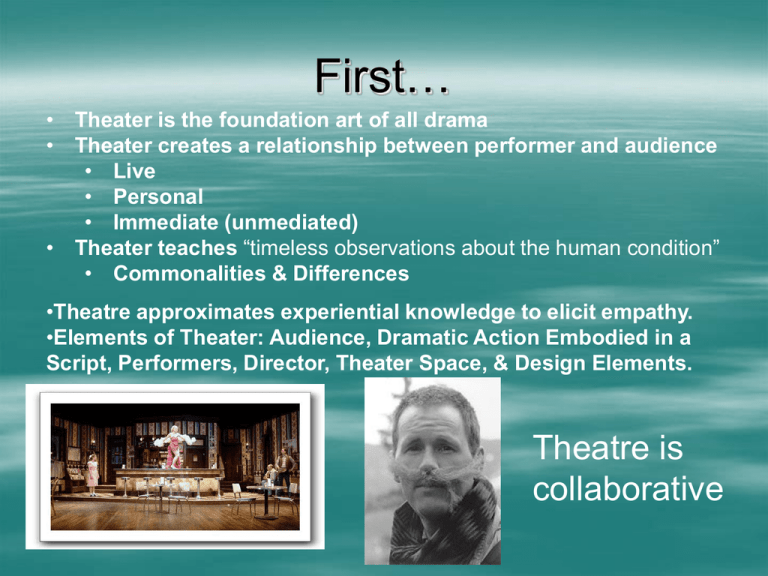
First… • Theater is the foundation art of all drama • Theater creates a relationship between performer and audience • Live • Personal • Immediate (unmediated) • Theater teaches “timeless observations about the human condition” • Commonalities & Differences •Theatre approximates experiential knowledge to elicit empathy. •Elements of Theater: Audience, Dramatic Action Embodied in a Script, Performers, Director, Theater Space, & Design Elements. Theatre is collaborative Theatre’s Origins Children’s Play Storytelling Ritual Ancient Greece – 5th Century BCE Polytheistic Artistic Increasingly commercial & literate Democratic – Demes – Tribes Misogyny Greek Theaters - Ephesus Delphi City Dionysia – Early 5th C. BCE Celebration of Dionysus Three Trilogies produced, each with a Satyr play afterward Actors wore masks – played several parts Chorus (audience’s representative on stage) danced in orchestra Aulis was a double reeded flute that was played Audience knew stories Know the difference between Story and Plot City Dionysia & Comdey Comedy came later – Late 5th Century BCE Old Comedy was satirical in nature – Aristophanes - added parabasis New Comedy (Late 4th Century BCE) romantic and domestic farce - slapstick Aristotle’s poetics 335 BCE - 6 elements – Plot, Character, Theme, Language, Music, Spectacle Aristotle’s Elements Aristotle’s poetics 335 BCE - identified 6 elements of theater. They are, in order: –Plot (NOT Story) –Character –Theme –Language –Music –Spectacle Aristotle’s Elements – Plot – Character – Theme – Language – Music – Spectacle These are great analytical tools. We are going to use them in many ways in this course. Do NOT, however, confuse them with production elements, which are a more modern notion. (More later.) Other Aristotle Terms to know Tragedy – Tragedy imitates “‘elevated’ actions and the ‘elevated’ characters who performed them.” Characters undergo a change of fortune. Comedy – Comedy imitates ridiculous actions “of people ‘worse’ than the average.” Mimesis – Innate to humans – “The chief purpose of all composition . . . is the imitation (mimesis) of reality.” – In Drama, imitations are of actions. Other Aristotle Terms to know II Hamartia – Heroes are “of high degree and reputation,” but they “are not saints… their sufferings are caused less by innate wickedness than because of hamartia (error).” (Brockett, History of Theater) Catharsis – “The katharsis of pity and fear is a complex but finally irrational pleasure of the quintessentially democratic art form. It is in a sense dismissive: public theaters seem to be good for a city in a way more like a system of sewers than like museums.” (Ford, ‘Katharsis: The Ancient Problem) Roman Theatres When Rome conquered Greece it borrowed a lot from Greek culture, including Theater. Roman Theater thrived from the 3rd century BCE to the first century CE. This Roman theater is in Libya. Roman Theatre Roman Theatre took place at the Ludi – games or festivals, which were religious & political Audience Focus is completely different. This theater is indoor, subsidized, political. Comedy is all like Greek New Comedy – situation comedies rather than satire. Entertainment to accompany ‘bread and circuses.’ Other Roman Entertainments •Chariot Races •Gladatorial Combat •Bloodsports This is why Roman Theatre was FREE Naumachia Roman Actors More than three Cloth masks No chorus Prologues and Epilogues Black wigs for young characters, white wigs for older characters, red wigs for slaves and servants In Rome, theater was done for different reasons it was practiced differently in differently shaped buildings. Using Aristotle’s Elements, how had theater changed? Plots, Characters & Themes • Greek Tragedy & Old Comedy concerned Kings, Heroes & Gods fighting for order in the universe. • Greek New Comedy concerned the wealthy and political figures fighting for their own political and social gain. • Roman Comedy concerned middle and lower class figures slapping each other around. Language – Apart from Seneca, Roman plays were written in a much more vernacular style. Greek plays were highly stylized – rhyming trochaic hexameter. Music – the simple aulis was replaced by more elaborate music to entertain. Spectacle – Giant masks replaced by cloth masks, scenery more elaborate in Ancient Rome. Concepts to keep in mind throughout the course Performance There are two meanings for the word ‘perform’ To pretend and to do These are not mutually exclusive Representation Political Artistic These are not mutually exclusive Two types of knowledge •Intellectual •Experiential Theatre approximates experiential knowledge to elicit empathy. These are not mutually exclusive
